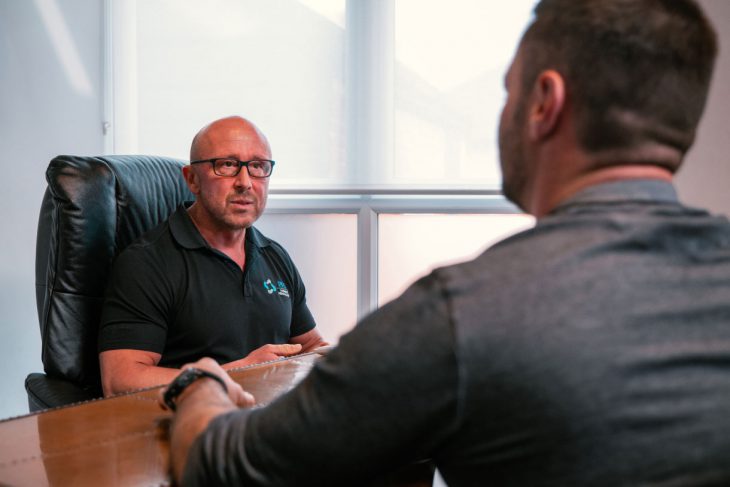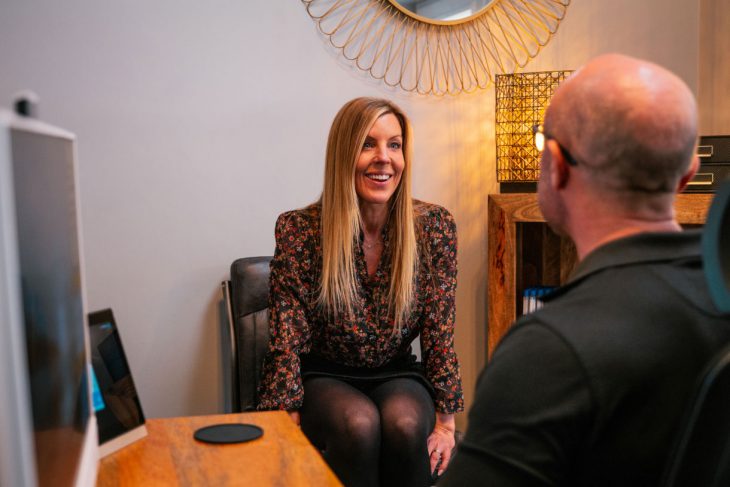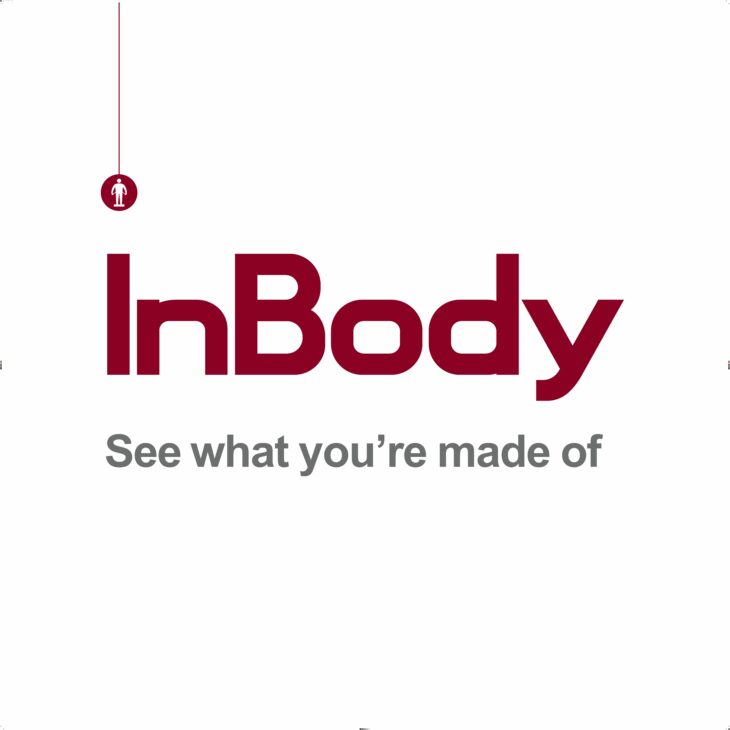Who are The Men’s Health Clinic?:
The Men’s Health Clinic is a private CQC registered medical clinic based in Dorset. We are an internationally recognised clinic, with patients travelling to us from all over the world.
We specialise in the diagnosis and treatment of Testosterone Deficiency using Testosterone Replacement Therapy (TRT). We also offer an array of diagnostic and holistic services to support this specialism. Our emphasis is one of prevention, using modern medicine as an adjuvant to the cornerstones of health; namely lifestyle, nutrition and exercise.
Terms like the ‘Male Menopause’ and the ‘Andropause’ serve no other purpose than to mislead the general public and trivialise something that can have a significant impact on a man’s quality and quantity of life. You wouldn’t deny a diabetic insulin, you wouldn’t show disdain for a hypothyroid patient requesting the most effective medications available and you most certainly wouldn’t trivialise the female menopause and live to tell the tale, you’d be lynched! So why not apply the same standard to Testosterone Deficiency?
Who Will Be Looking After Me?:
Dr Robert Stevens is the Founder & Medical Director of The Men’s Health Clinic, and is also our lead clinician. Dr Sean Williams and Dr Harpreet Uppal work alongside Dr Stevens, and are both highly skilled and experienced doctors. Joseph Hearnshaw is our Medical Research Scientist, providing you with the latest evidence-based information and perspective relating to Testosterone Replacement Therapy.
Our clinical team is supported by our experienced and dedicated administrative team, and together we aim to offer you an unrivalled patient-centred service. Our mission is to set the standard, not simply meet the current one.
How is The Men’s Health Clinic Different From Other TRT Clinics & Online Providers?:
We offer a personalised approach to patient care. Your individualised protocol is particular to your genetics, physiology and requirements. There is no one-size-fits-all protocol, much like you are not identical in make-up to the next person. It is also important to appreciate that nature is not constant and is subject to change. A sledgehammer approach to TRT demonstrates a basic lack of understanding and appreciation of Testosterone Deficiency and TRT.
We pride ourselves in offering our patients a personal, complete service. The doctor-patient relationship is sacred, medical treatments such as TRT should not be simply ‘shopped’ for, you need to be constantly working together with your doctor if you are going to achieve your goal in restoring and optimising your hormonal health.
We insist on face to face consultations for all new patients for a number of reasons. If we are going to effectively manage your long-term health and always work to act in your best interests, we need to meet you in clinic in person, not via a computer/video screen, and begin building that patient-doctor relationship. We have an ever growing number of international patients and patients who live long distances from clinic, yet we still insist on an annual face to face consultation in clinic despite this. Once on board, our patients always understand why.
One of our primary objectives is to increase your level of understanding regarding Testosterone Deficiency, Testosterone Replacement Therapy and the bigger picture, which is your overall health. We work with you so that you have realistic expectations, there are never any grandiose or false promises.
We are fully transparent about every aspect of your care as we want you to be fully engaged in the process. TRT is a lifelong medication and so we need to ensure a healthy doctor-patient relationship, built upon trust, in order for it to serve your best interests.
What is "Gold Standard" Care?:
We have used the British Society for Sexual Medicine guidelines and the American TRT model to create our own TRT protocols and management plans, specifically tailored to meet your individual requirements. We are always having patients transfer their care over to us from the NHS and other private clinics and providers, because they recognise the benefits of doctor-led, personalised, gold standard care.
Our gold standard TRT of choice is daily subcutaneous Testosterone Cypionate and Human Chorionic Gonadotropin (hCG) injections, which we have found to be the most effective method of achieving stable male androgen levels and an improvement in overall well-being. Our prescribing methods are described in the article Microdosing TRT – The Future of Testosterone Replacement Therapy. HCG is used alongside testosterone to help preserve testicular function and fertility, amongst other reasons, which is discussed in more detail below. However, we do offer other TRT Options also.
Gold standard care extends far beyond your choice of treatment options. We pride ourselves on the personal, accessible service that we offer and our patients recognise the benefits of this. Have a read of our testimonials page and many online reviews to see what they have to say.
Should HCG Be Part of My TRT Protocol?:
100% YES.
Human Chorionic Gonadptropin (hCG) used alongside testosterone:
- Increases fertility
- Maintains/restores testicular size
- Improves libido and penis sensitivity
- Up-regulates other steroid hormones
Our article, The Benefits of Using HCG with TRT, goes into more detail on this subject.
TRT – Use or Abuse?:
You should only commit to TRT if you have a true deficiency and you cannot reverse your low levels without the need for testosterone and HCG. TRT is a lifelong medical therapy, it’s not a supplement to ‘top up’ your levels, it’s an essential medication for health. TRT is effective if you have TD, however it is not as effective as your own body if your levels can be improved without disruption of the Hypo-Pituitary Gonadal axis.
The purpose of TRT is to restore your androgen levels so that homeostasis can be achieved, no more, no less. From a biological perspective, irrespective of whether you are a creationist or evolutionist, we are supposed to pass on our DNA to the next generation and provide a stable environment, nature and nurture. In order to do that we need healthy, stable androgen levels and with that comes adequate sexual function in order to procreate.
The Broscience brigade and some online private TRT providers still advocate supraphysiological levels in the foolish belief that more is better. Chasing numbers is a fool’s errand. Supraphysiological levels does not make you more ‘alpha’, it won’t turn you into Arnie and they won’t make you a Stallion in the bedroom. In fact, it’ll do quite the opposite, it’ll make you anxious, tired, have a paradoxical low sex-drive and give you weaker erections. Water retention and gynaecomastia await. The perils of one-size-fits-all protocols and not being personally monitored by a medical doctor.
In the world of sports, testosterone is considered a performance-enhancing drug. Too much testosterone is actually a performance-diminishing drug as the side effects of supraphysiological levels and the consequent disruption in androgen levels has a negative impact on health.
Optimising your androgen levels is about understanding the role and function of testosterone in male health. Your optimal androgen levels are particular to you, we will work with you to find those levels.
Blast & Cruise?:
We do not judge people at The Men’s Health Clinic, that is not our role and nor is it our nature. Past indiscretions are not our concern, we’ve all made mistakes as it’s part of being human and usually how we learn. We only ask that you respect the fact that we are a registered and regulated medical clinic, and the ethos of our clinic is prevention and optimised health.
Increasing awareness and adding legitimacy to male hypogonadism as a medical condition needs to be respected, there can therefore be NO association between TRT and androgenic anabolic steroid use.
Who is Not a Suitable Candidate for TRT at The Men’s Health Clinic?:
According to the current BSSM Guidelines, TRT is contraindicated in males with:
- Locally advanced or metastatic prostate cancer
- Male breast cancer
- Haematocrit higher than 54%
- Severe chronic heart failure
Additional contraindications can (but not necessarily in every case) also include:
- A Prostate Specific Antigen (PSA) measurement of more than 4 ng/mL (or more than 3ng/mL in men at high risk of prostate cancer, such as African Americans and those with first-degree relatives who have had prostate cancer)
- Untreated severe sleep apnoea
- Severe Lower urinary tract symptoms (LUTS) associated with benign prostatic hyperplasia
Testosterone Deficiency is a well-recognised medical condition and you should only commence TRT if you have a true deficiency. It can be very difficult to be objective when you are desperate for help, and we often have tunnel vision when seeking that help. This is why we cannot emphasise enough how important it is to have a face to face consultation prior to starting TRT. We can take responsibility for your treatment, but we need to have that commitment from you in order to work in your best interests and maintain the capacity to be objective.
This is your health, which should be treated with respect. Whilst the onus is on you to take responsibility for it, we are here with 20+ years of medical experience to help you with your journey.
What Are the Potential Side-Effects of TRT?:
It stands to reason that if your androgen levels have been ‘optimised’, you shouldn’t have any negative side effects. The goal of TRT is restoring and optimising your androgen levels so that you feel ‘normal’. If you have a true deficiency and need TRT, we can hopefully get you pretty close to The Perfect TRT Protocol.
“Perfection is not attainable, but if we chase perfection, we can catch excellence.” – Vince Lombardi.
Side effects tend to reflect a level of unbalance. As already discussed, most side effects can be simply managed with alteration of dose and/or frequency of your protocol, looking at possible aggravating factors and the sparing use of ancillary medications.
Potential side effects include:
- Oestrogenic (E2) – Nipple tenderness, breast tissue swelling, water retention, loss of libido, anxiety.
- Dihydrotestosterone (DHT) – Acne, oily skin, male pattern baldness, lower urinary tract symptoms.
- Free Testosterone – Mood disturbance, loss of libido, deterioration of lipid profile, raised haematocrit
Possible injection side effects:
- Infection
- Bleeding
- Nerve damage
- Scar tissue development
As with any medication, allergic reactions to any of the ingredients of the preparation may also occur. It is therefore essential that you read the information leaflet that comes with the medication prior to administration.
Will TRT Affect My Fertility?:
We have an ever growing number of patients who have successfully managed to conceive on TRT, some who have done so multiple times. Typically, exogenous testosterone disrupts the Hypo-Pituitary Gonadal axis meaning that Lutenising Hormone (LH) and Follicle Stimulating Hormone are no longer produced, which often results in infertility. This is one of the reasons we always recommend using HCG alongside testosterone, as it helps to restore the axis through HCG’s action of mimicking LH.
Will TRT Raise My Haematocrit?:
Testosterone is an anabolic hormone. One of its many functions is to ensure adequate production of red blood cells so that your blood can effectively deliver oxygen to your organs. This process is called erythropoiesis, i.e.. production of red blood cells, the topic is addressed in the article TRT & Erythrocytosis – Facts and Recommendations.
A significant rise in haematocrit can result in your blood becoming too viscous, increasing your risk of clots. People also describe negative subjective symptoms, such as lethargy, weakness and dizziness from a moderate rise. Fortunately, this isn’t very common and normally reflects either an aggressive protocol or an underlying pathology. Therefore, it is essential to regularly monitor your Full Blood Count whilst on TRT to ensure that it does not rise above normal limits. Venesection or blood donation is the treatment of choice if this happens.
Will TRT Increase My Risk of Prostate Cancer?:
Testosterone does not increase your risk of developing prostate cancer, something discussed in the article Dispelling the Myths: Prostate Cancer & Testosterone Replacement Therapy (TRT). Interestingly the incidence of prostate cancer rises when testosterone levels fall with age and there is a concurrent increase in oestrogen, predominantly due to a relative rise in oestradiol.
Whilst testosterone does not increase your risk of prostate cancer, it is prudent to still regularly monitor your Prostate Specific Antigen (PSA) level AND, if you’re over 40, ensure you have an annual digital rectal examination which will be routinely carried out as part of your annual physical examination in clinic.
The Future of TRT:
We believe we are pioneering the future of TRT. No other clinic has a better understanding or appreciation of Testosterone Deficiency and its management. If you don’t believe us, please familiarise yourself with our education page, our Facebook page and our independent closed Facebook group TRT in the UK.
Alternatively, feel free to follow us on YouTube and Instagram to see how we are fully committed to raising awareness of Testosterone Deficiency in the UK and setting a new standard in TRT.
The Men’s Health Clinic… Working with nature, not against it!
“It is not the strongest or the most intelligent who will survive but those who can best manage change.” – Charles Darwin





